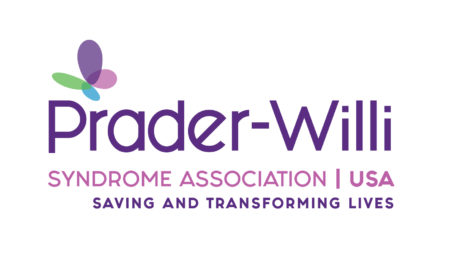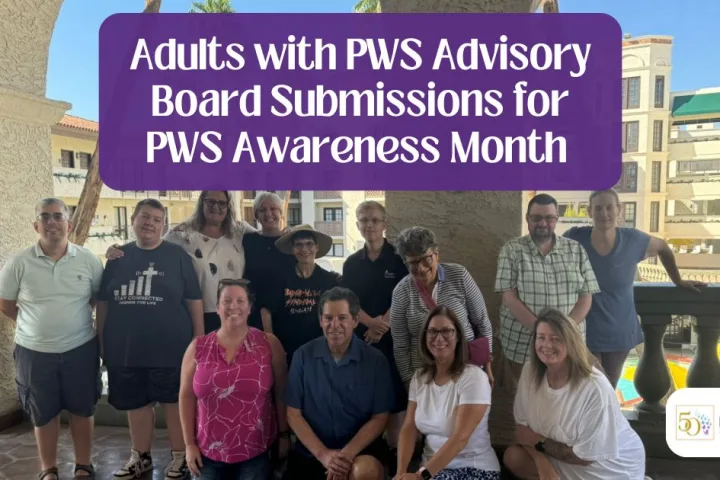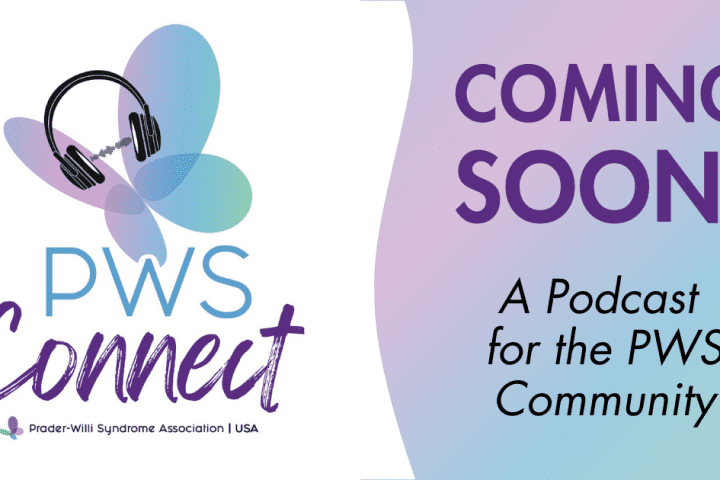In honor of October being National Mental Health Awareness month, we are presenting a 4-part series on supporting and caring for a person with PWS who is facing a mental health diagnosis.
According to the National Alliance on Mental Illness (NAMI), mental illness is “a condition that affects a person’s thinking, feelings, behavior or mood. These behaviors become more problematic when they interfere with daily activities and/or impacts how a person relates to others.” Children and adults with PWS can be impacted by varying degrees of mental health challenges. Some face these challenges as a child but most who face them will do so in their teen years and later.
The question that faces most parents is, “Are these concerning behaviors a part of PWS or is it more?” The answer often is not easy. There is a great handout available on the PWSA | USA website (www.pwsausa.org) titled “Mental Health and Behavior ” by Jan Forster, M.D, Linda Gourash, M.D., and Kathy Clark, RN, MSN. It is an excellent resource and guide to help you as you work through this question. If there is a sudden change in the person’s mood or behavior, he or she should be evaluated by their primary care professional. There are some medical conditions that impact behavior that should be ruled out. If your loved one is not able to function at school or home without significant behavior outbursts, especially if you have tried behavior management strategies and maintained structure and consistency, it may be time to seek help from a mental health professional. Behavior management interventions should be the first treatment approach tried.
So, what does it mean when your loved one with PWS is given a mental health diagnosis? There can be a lot of mixed emotions that accompany this. Grief … and all the varying ways to express this emotion knowing the person has yet another chronic health issue to live with. Relief … to know what the problem is and that there are things that can be done to make them better. Some of the more common mental health illnesses seen in persons with PWS include anxiety disorder, obsessive-compulsive disorder, bipolar disorder and depression. The following are short descriptions of these disorders. For more extensive information go to the National Alliance on Mental Illness website at www.nami.org. PWSA |USA also has a great handout, “The Mental Health of People with Prader-Willi Syndrome with Specific Focus on Mood Disorders and Psychotic Illness” by Dr. Tony Holland that may be of help as well. It is available on their website www.pwsausa.org. There are different genetic types of PWS that have been found to have a greater risk of mental illness.
ANXIETY DISORDER causes an individual to experience extreme fear and distress to the point where it becomes overwhelming. The person may have feelings of apprehension, restlessness, irritability and/or worrying to the point of interfering with their ability to function normally. In children, anxiety can often exhibit as irritability and anger. Treatment focuses on psychotherapy and behavior therapy, along with learning relaxation techniques to reduce stress. For persons with PWS, it is also helpful to try to identify the source of the anxiety and try to work at minimizing exposure to this. In extreme cases, medications may be prescribed.
OBSESSIVE-COMPULSIVE DISORDER (OCD) involves persistent, intrusive thoughts (obsessions) and repetitive behaviors that a person feels they must perform (compulsions). The exact cause is unknown but researchers believe the brain is not responding normally to serotonin, a chemical in the brain. Treatment often focuses on psychotherapy, behavior therapy and medication (to help balance the serotonin receptors).
BIPOLAR DISORDER is broadly defined as a cycle of manic and depressive episodes. Manic episodes may include symptoms of high energy, reduced need for sleep and a loss of touch with reality. Depressive episodes may include symptoms such as low energy, low motivation and a loss of interest in daily activities. These episodes may include thoughts of suicide. These episodes can last for days, months and longer. Treatment focuses on medications and psychotherapy. Depending on the severity of symptoms, hospitalization may be indicated. Steps must be taken to keep the person safe.
DEPRESSION is mental health illness characterized by a persistent depressed mood or a loss of interest in activities which impairs their daily life. It can be accompanied by thoughts of suicide. Children and the developmentally disabled often do not exhibit classic signs of depression. They may act out more or have trouble engaging in activities and appear unmotivated. Treatment includes use of psychotherapy, and/or behavior therapy. In extreme cases, medications may be tried.
Children and adults often face challenges with a mental health illness. This is the first in a series of four articles that will help to educate you and provide resources to help you as you face these diagnoses. Many people with PWS have been successful in managing these with medications, behavior therapy and a lot of support from those around them.
Contributed by Barb Dorn and reviewed by Dr. Jan Forster





 Jennifer Bolander has been serving as a Special Education Specialist for PWSA (USA) since October of 2015. She is a graduate of John Carroll University and lives in Ohio with her husband Brad and daughters Kate (17), and Sophia (13) who was born with PWS.
Jennifer Bolander has been serving as a Special Education Specialist for PWSA (USA) since October of 2015. She is a graduate of John Carroll University and lives in Ohio with her husband Brad and daughters Kate (17), and Sophia (13) who was born with PWS. Perry A. Zirkel has written more than 1,500 publications on various aspects of school law, with an emphasis on legal issues in special education. He writes a regular column for NAESP’s Principal magazine and NASP’s Communiqué newsletter, and he did so previously for Phi Delta Kappan and Teaching Exceptional Children.
Perry A. Zirkel has written more than 1,500 publications on various aspects of school law, with an emphasis on legal issues in special education. He writes a regular column for NAESP’s Principal magazine and NASP’s Communiqué newsletter, and he did so previously for Phi Delta Kappan and Teaching Exceptional Children. Evan has worked with the Prader-Willi Syndrome Association (USA) since 2007 primarily as a Crisis Intervention and Family Support Counselor. Evans works with parents and schools to foster strong collaborative relationships and appropriate educational environments for students with PWS.
Evan has worked with the Prader-Willi Syndrome Association (USA) since 2007 primarily as a Crisis Intervention and Family Support Counselor. Evans works with parents and schools to foster strong collaborative relationships and appropriate educational environments for students with PWS. Dr. Amy McTighe is the PWS Program Manager and Inpatient Teacher at the Center for Prader-Willi Syndrome at the Children’s Institute of Pittsburgh. She graduated from Duquesne University receiving her Bachelor’s and Master’s degree in Education with a focus on elementary education, special education, and language arts.
Dr. Amy McTighe is the PWS Program Manager and Inpatient Teacher at the Center for Prader-Willi Syndrome at the Children’s Institute of Pittsburgh. She graduated from Duquesne University receiving her Bachelor’s and Master’s degree in Education with a focus on elementary education, special education, and language arts. Staci Zimmerman works for Prader-Willi Syndrome Association of Colorado as an Individualized Education Program (IEP) consultant. Staci collaborates with the PWS multi-disciplinary clinic at the Children’s Hospital in Denver supporting families and school districts around the United States with their child’s Individual Educational Plan.
Staci Zimmerman works for Prader-Willi Syndrome Association of Colorado as an Individualized Education Program (IEP) consultant. Staci collaborates with the PWS multi-disciplinary clinic at the Children’s Hospital in Denver supporting families and school districts around the United States with their child’s Individual Educational Plan. Founded in 2001, SDLC is a non-profit legal services organization dedicated to protecting and advancing the legal rights of people with disabilities throughout the South. It partners with the Southern Poverty Law Center, Protection and Advocacy (P&A) programs, Legal Services Corporations (LSC) and disability organizations on major, systemic disability rights issues involving the Individuals with Disabilities Education Act (IDEA), Americans with Disabilities Act (ADA), and the federal Medicaid Act. Recently in November 2014, Jim retired.
Founded in 2001, SDLC is a non-profit legal services organization dedicated to protecting and advancing the legal rights of people with disabilities throughout the South. It partners with the Southern Poverty Law Center, Protection and Advocacy (P&A) programs, Legal Services Corporations (LSC) and disability organizations on major, systemic disability rights issues involving the Individuals with Disabilities Education Act (IDEA), Americans with Disabilities Act (ADA), and the federal Medicaid Act. Recently in November 2014, Jim retired.